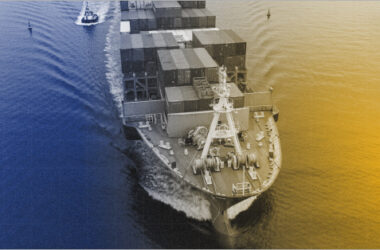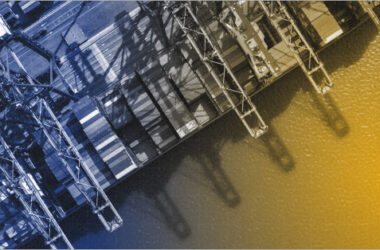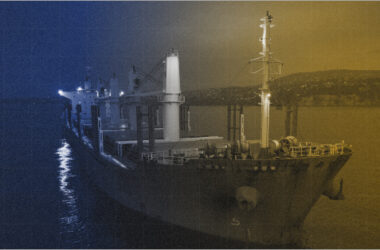The purpose of Inland Insurance is to cover risk on goods under one policy. The movement of goods from one place to another within the country is termed as inland.
What is Marine Insurance?
As the name implies, Marine Insurance covers the loss or damage of cargo or goods during transit from a point of origin to a destination. In addition to road, railway, air, sea, couriers and postal services, marine insurance policies provide coverage for all modes of transportation.
Generally, Marine Transit Insurance covers losses incurred during transit because of fire, explosions, hijackings, accidents, collisions, and overturning. We help you get customized plans for covering the risk of theft, malicious damage, shortage, and non-delivery of goods, damages during loading and unloading, and mishandling of goods/cargo. It is possible to select the coverage based on the insured’s specific business needs. It is available for a wide range of cargo and goods, whether you are dealing with them or producing them.
Who needs marine insurance?
Having Marine Transit Insurance is essential for businesses and individuals alike. Business shipments are usually high in value and any damage can directly impact business. When it comes to an individual, relocation is regarded as one of the most stressful life events, be it for job change or marriage. Whatever your reason may be for transporting your goods, our policy protects your goods against material damages.
Marine Transit Insurance Policy can be assigned to any firm who acquires insurable interest during transit of the cargo if they have an insurable interest in the goods.
· Traders & Manufacturers
· Importers & Exporters
· Merchant Exporters
· Contractor of Projects
· Logistics Operators
· C&F Agents
How can Marine Transit Insurance benefit you?
As a professional, the value of your goods is immeasurable. They not only generate revenue but also secure the future of your business. By insuring them during transportation, you ensure the protection of both yourself and your business against any unforeseen incidents. Similarly, if you are an individual relocating for personal or professional reasons, numerous concerns may occupy your mind already. Each household item holds cherished memories and has been carefully accumulated throughout your life’s journey. Assurance that all your belongings are safeguarded provides a sigh of relief amidst these worries.
Is Marine Cargo Insurance suitable for all types of cargo?
Commodities/cargo include:
· Cargo that is general in nature such as furniture, spare parts, footwear, electronic items, food items, textiles, etc.
· A variety of metals, including plastic, iron and steel rolls, and leather
· Machines: Standard size in containers. Oversized in bulk containers.
· Oils, edible oils, and other liquid bulk cargoes.
· Bulk cargo consists of loose goods, such as coal, grain, ore, etc.
What is included in Marine Insurance?
Marine Transit Insurance includes all forms of transportation, such as air, water, rail, and road. It also provides insurance for goods being transported through courier services. Your goods in transit will be safeguarded against vehicle collision, overturning, derailment, or accidents occurring anywhere between the starting point and the destination. Additionally, you can choose to extend this coverage for loss or damage caused by theft, strikes, riots, terrorism, and other hostile acts by humans based on your specific requirements.
Frequently Asked Questions
1. What is not included in Marine Cargo Insurance (inland) cover?
· A willful act on the part of the assured
· Leakage, weight loss, or volume loss of the subject matter insured
· Packing that is inadequate or unsuitable
· A vice or nature inherent in the insured subject-matter
· Delay
· Owner, manager, charterers, or operators of the vessel filing for bankruptcy or financial default
· Transport conveyances that are unfit/unseaworthy
2. How do common warranties, conditions, and exclusions work?
A Marine Cargo Insurance Policy comes with the following general conditions or warranties:
· There is no rusting, oxidation, discoloration, or corrosion unless caused by ICC(B) perils
· Replacement clause for institutes
· Set and pair clauses
· Replacement clause for second-hand goods
· Mechanical, Electrical, and Electronic derangement is excluded, unless caused by an ICC (B)/ITC (B) peril.
· Warranty for over-dimensional cargo surveys.
· Losses resulting from adulteration, contamination, and deterioration of quality are excluded.
· A tarpaulin or other water-proof material shall be covered over closed wagons and/or trucks to prevent water infiltration.
3. Is there a limit per sending?
It represents the maximum amount insured for a single shipment or consignment during the ordinary course of transit, in the event of a claim.
4. Sum Insured: What does it mean?
The sum insured is the maximum amount that would be payable in the event of a total loss of the goods in transit, including freight, taxes, and port handling charges.
Insured sums will include:
· The cost of the goods will either be (CIF)/FOB/C&F
· Internal freight & cleaning charges
· Customs duty
5. What is the meaning of Perils of the Sea?
Usually, “perils of the seas” refers to accidents or casualties caused by the sea but does not include ordinary weather conditions such as wind and waves.
Example
A well-established engineering firm, ABC Pvt. Ltd. enjoys a wide spread of clients, and the company is looking for a way to obtain insurance coverage in case it faces any challenges in the transportation of goods.
Solution
When ABC Engineering purchases Inland Transit Insurance, they are protected against financial losses, partial losses, and related expenses if a misfortune occurs. This coverage would cover the goods while they are in inland transit. Since the company only deals domestically, inland transit coverage is an excellent choice for it, as it would cover it against lightning, fire, etc.
As ABC Engineering often transports goods by taking the help of a third party, when it buys Inland Transit Insurance, the company should inform the insurer of this fact and choose goods in transit coverage. If you use a third-party carrier, this insurance policy covers any loss or damage incurred by the carrier.
If using a third-party carrier, the third party is liable for any loss or damage that occurs. In addition, you can purchase Inland Transit Insurance cover to cover third-party losses.
Conclusion
Marine Insurance’s Inland Transit Coverage serves as a dynamic protector of goods in overland transit. From the basic protection of Basic Risk Cover to the comprehensive protection of All Risk Cover, this active insurance component makes sure cargo remains secure throughout the journey.








